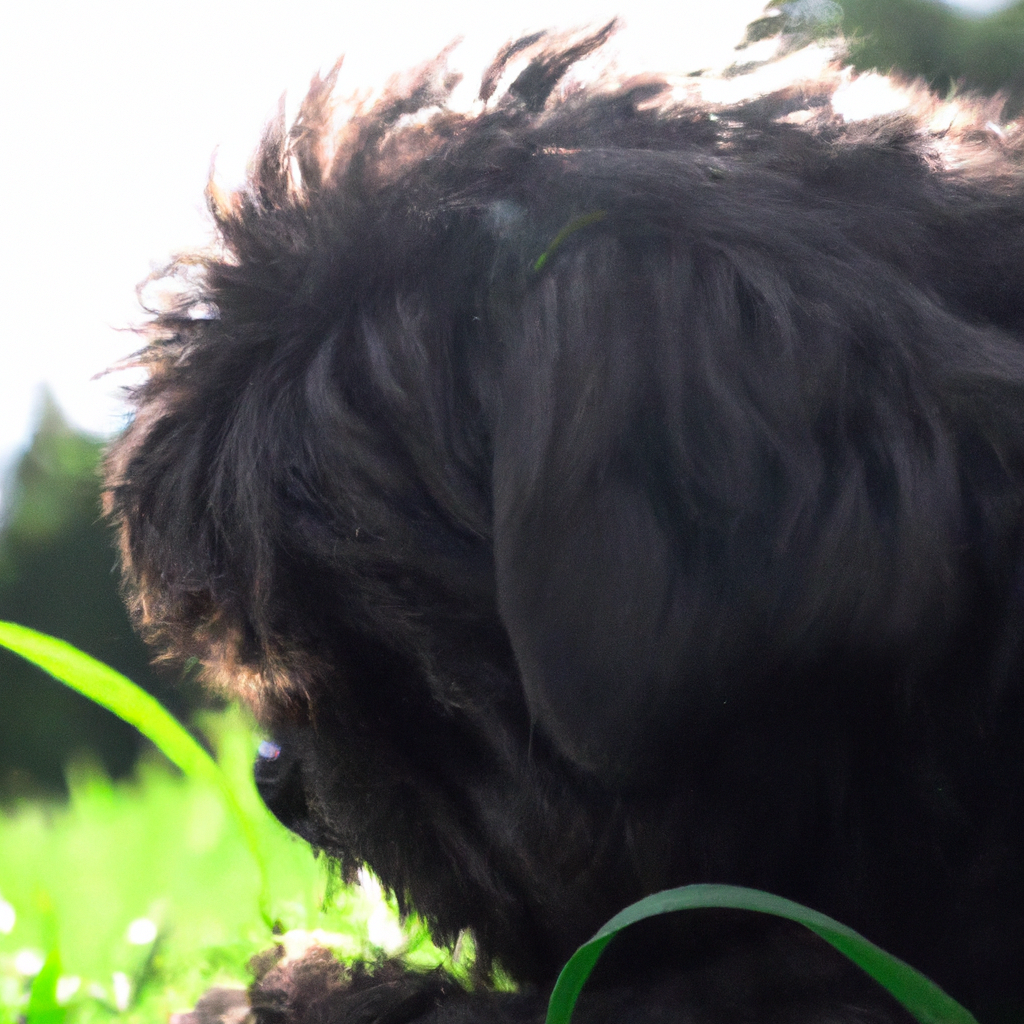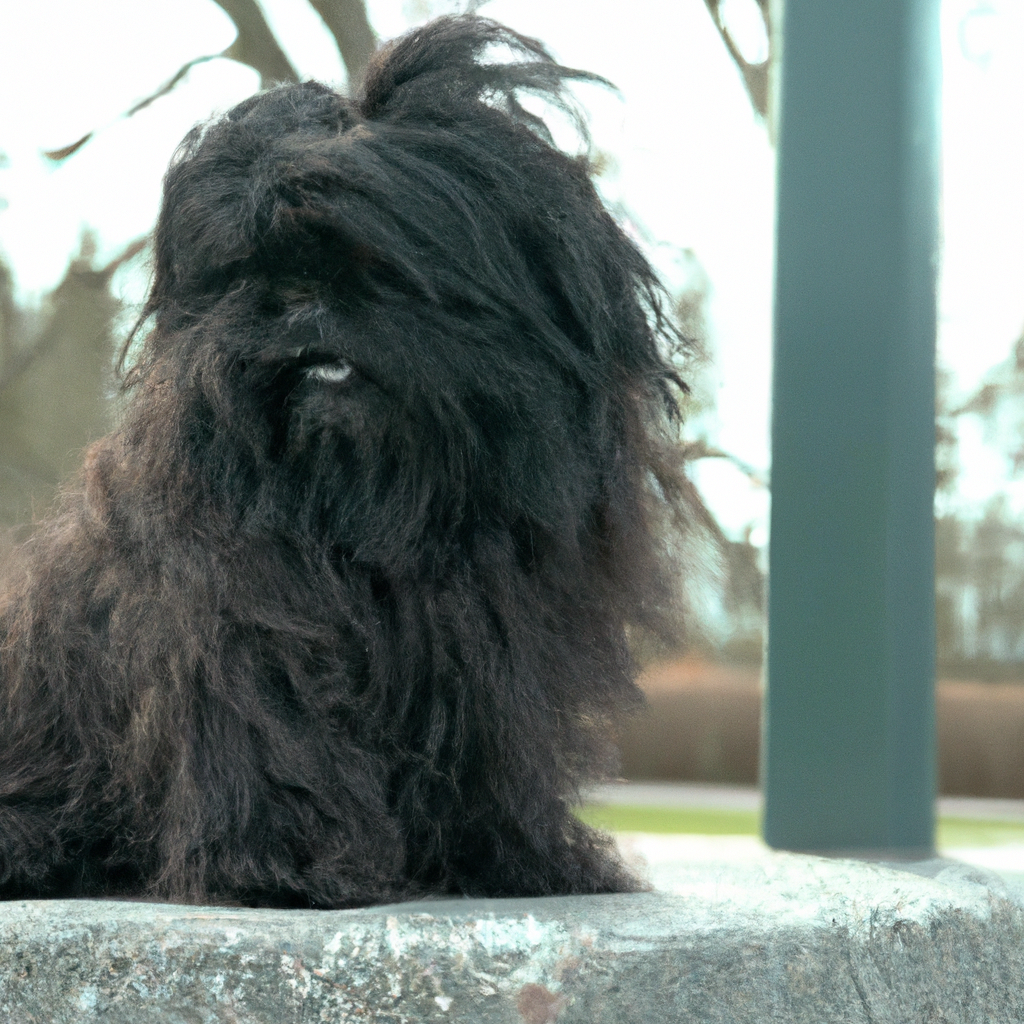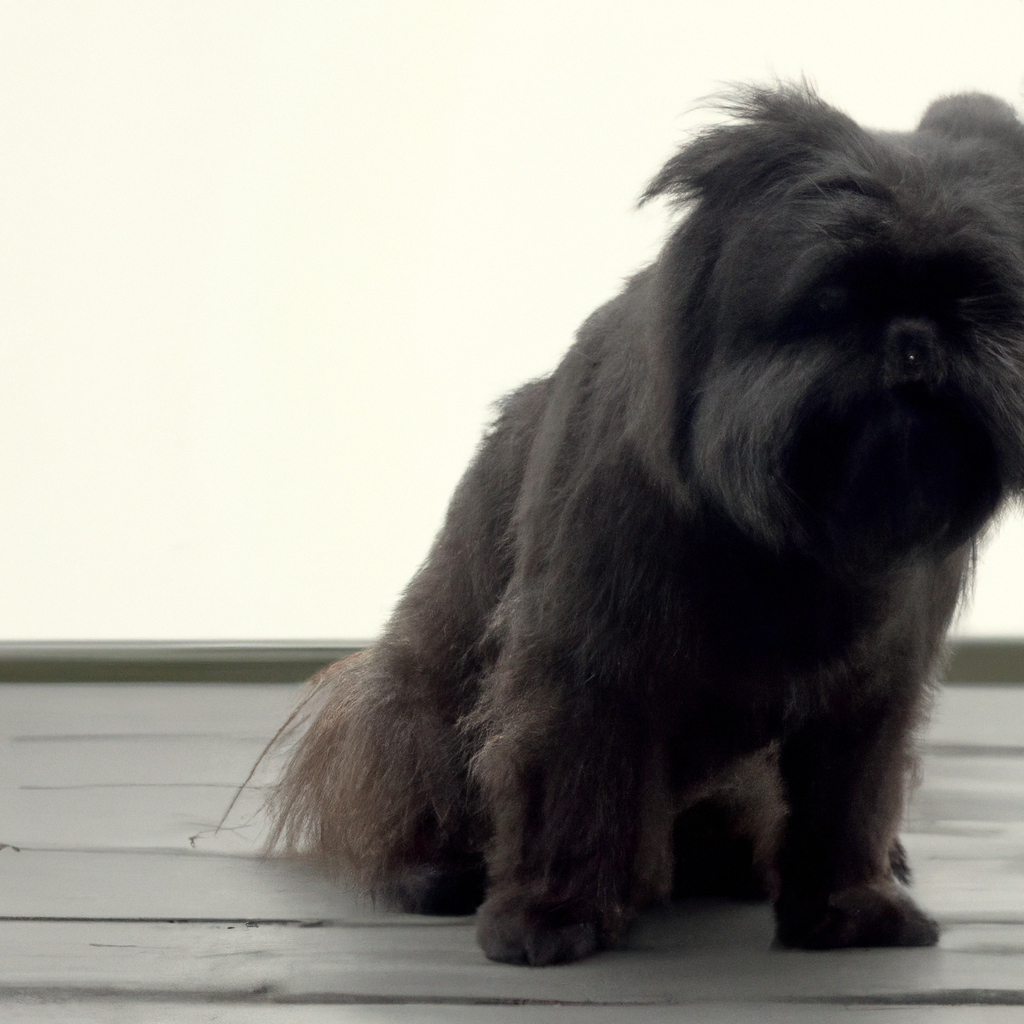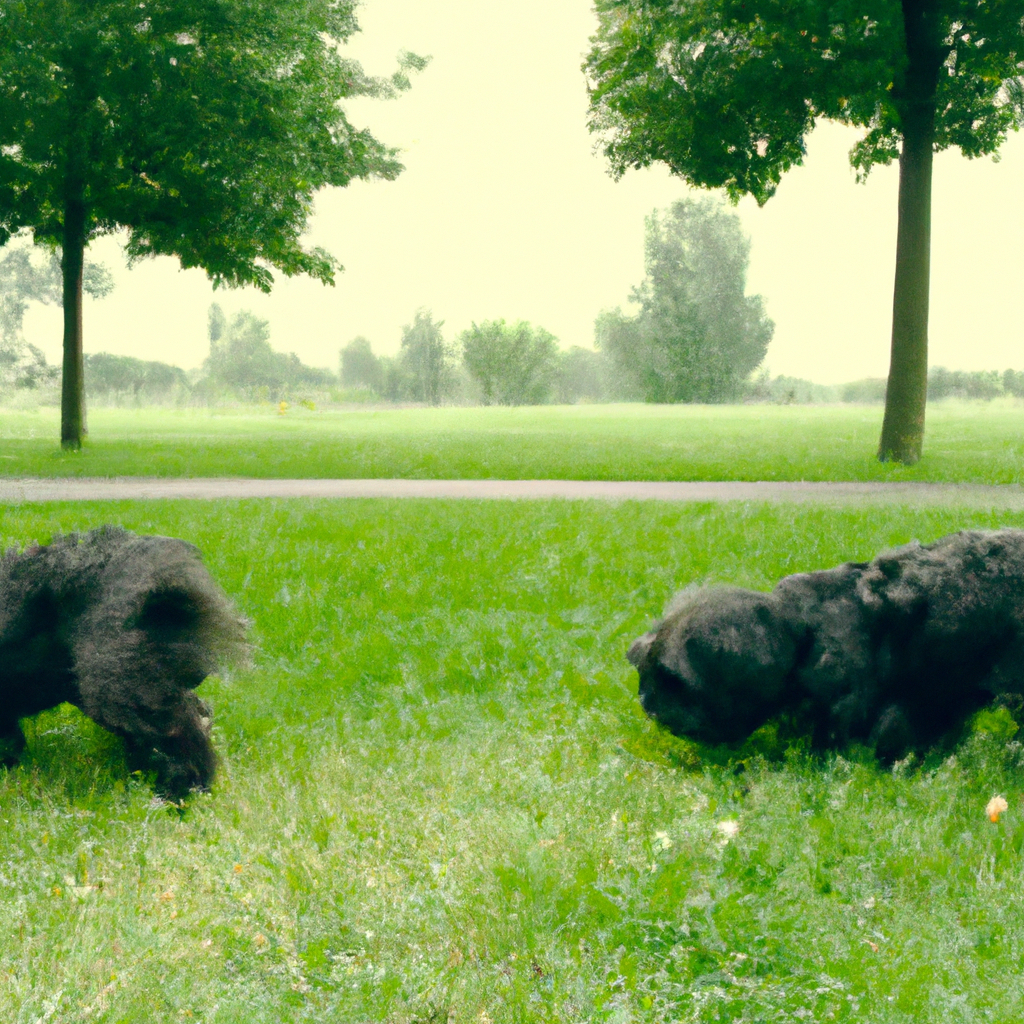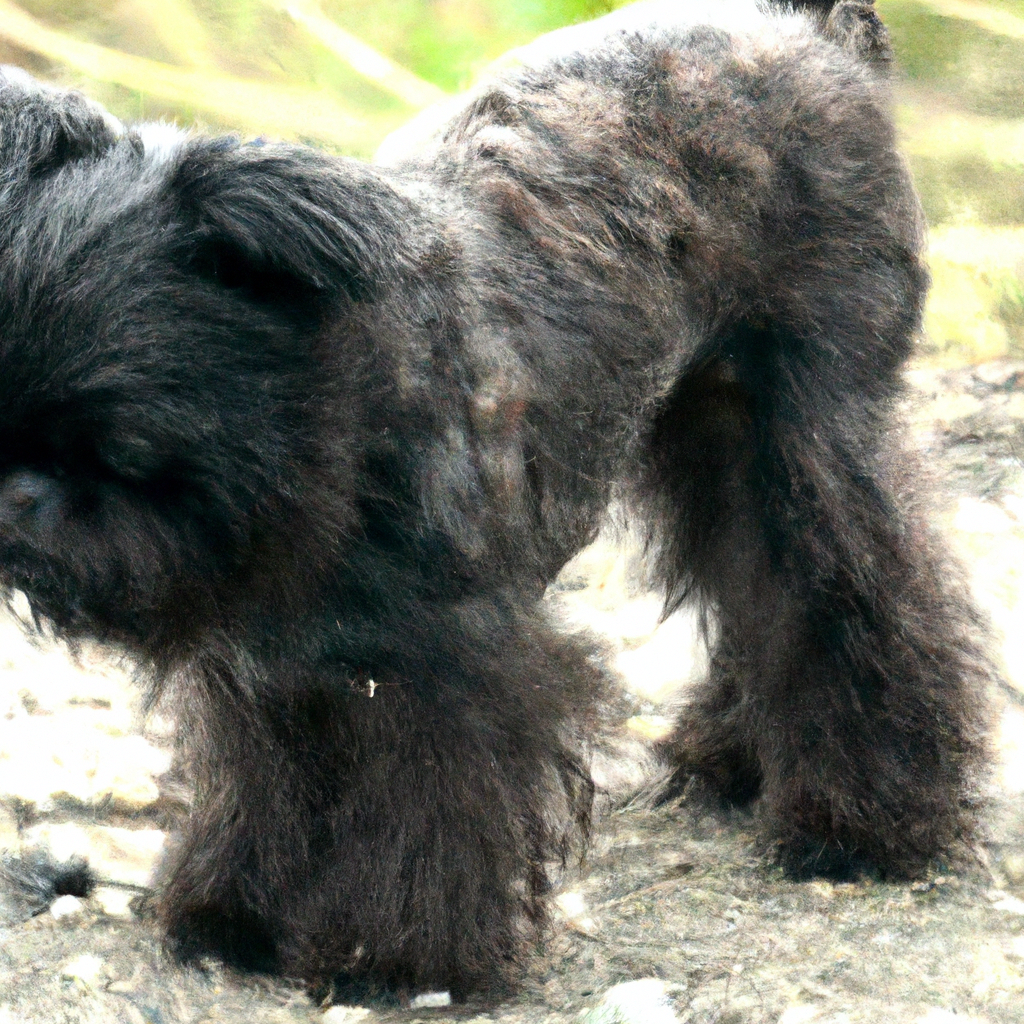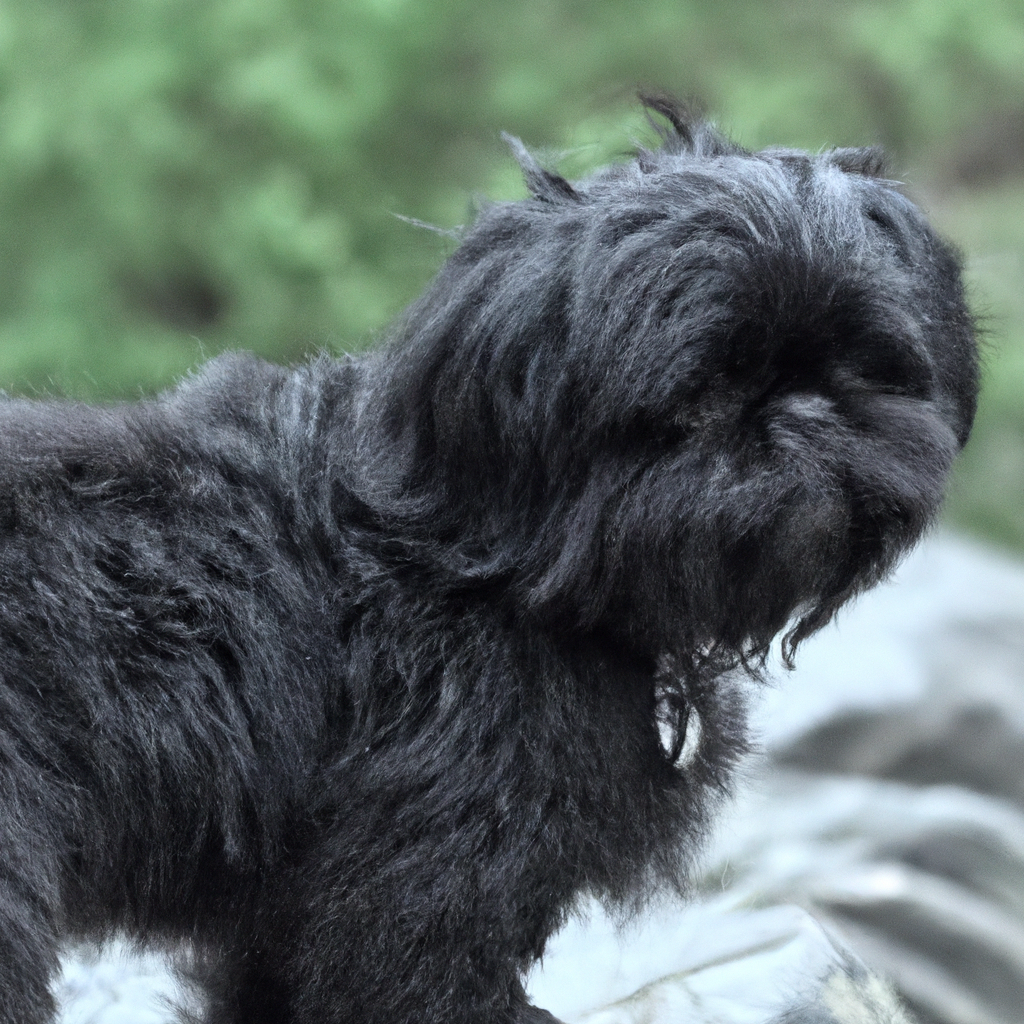The Affenpinscher breed, also known as the “Monkey Terrier” due to its primate-like appearance and personality, is a small but sturdy dog breed originating from Germany. Known for their distinctive, scruffy face and dense, shaggy coat, Affenpinschers are typically black in color but can also be found in shades of grey, silver, red, or tan. They are characterized by their fearless, confident, and often comically serious demeanor. Despite their small size, they are known for their protective nature and alertness, making them excellent watchdogs. Affenpinschers are also highly intelligent, curious, and stubborn, with a playful and adventurous spirit. They require moderate exercise and are adaptable to both apartment living and larger homes. Their loyalty and affectionate nature make them great companions, although they may be somewhat reserved around strangers and children.
Understanding the Unique Temperament of Affenpinscher Breed
The Affenpinscher breed, often referred to as the “Monkey Terrier” due to its primate-like appearance and playful nature, is a small but mighty dog breed that is full of personality. This breed is known for its unique temperament, which is a delightful blend of charm, spunk, and a dash of stubbornness. If you’re considering adding an Affenpinscher to your family, it’s essential to understand their unique temperament to ensure they’re the right fit for your lifestyle.
Affenpinschers are known for their bold and confident demeanor. Despite their small size, they carry themselves with a certain bravado that is both endearing and entertaining. They are fearless, not easily intimidated, and are often described as having a larger-than-life personality. This confidence makes them excellent watchdogs, as they are always alert and ready to protect their family. However, their boldness can sometimes lead them into trouble, especially if they decide to take on a much larger dog or a perceived threat.
Another characteristic of the Affenpinscher breed is their high energy levels. These dogs are lively, active, and always ready for a game or an adventure. They love to play and will often initiate games with their owners or other pets in the household. This high energy level means they require regular exercise to keep them happy and healthy. A bored Affenpinscher can become destructive, so it’s important to provide them with plenty of toys and activities to keep them occupied.
Despite their energetic nature, Affenpinschers are also known for their affectionate and loyal temperament. They form strong bonds with their families and are happiest when they are spending time with their loved ones. They enjoy cuddling and being close to their owners, often following them around the house. This loyalty and affection make them excellent companions, but it also means they can suffer from separation anxiety if left alone for long periods.
One of the more challenging aspects of the Affenpinscher’s temperament is their stubbornness. They are intelligent and quick learners, but they also have a mind of their own and can be resistant to training. This stubborn streak requires a patient and consistent owner who is willing to put in the time and effort to train them properly. Positive reinforcement methods work best with this breed, as they respond well to treats and praise.
Finally, Affenpinschers are known for their sense of humor. They are often described as ‘clowns’ due to their playful and mischievous nature. They love to entertain and will often perform tricks or antics to make their owners laugh. This sense of humor, combined with their affectionate nature and bold personality, makes them a joy to have around.
In conclusion, the Affenpinscher breed is a unique blend of boldness, energy, affection, stubbornness, and humor. They are not the easiest breed to train due to their stubborn nature, but their loyalty, affection, and sense of humor make them a rewarding and entertaining companion. Understanding the Affenpinscher’s unique temperament is key to building a strong and happy relationship with these charming little dogs.
The Affenpinscher: A Comprehensive Guide to Their Health Issues
The Affenpinscher, often referred to as the “Monkey Dog” due to its primate-like appearance and playful nature, is a small but sturdy breed that originated in Germany. Despite their diminutive size, these dogs are known for their tenacity and protective nature, making them excellent companions. However, like all breeds, the Affenpinscher is prone to certain health issues that potential owners should be aware of.
One of the most common health issues in Affenpinschers is hip dysplasia, a condition where the hip joint doesn’t fit together properly, causing pain and mobility issues. This condition is often genetic, so it’s important to ensure that any Affenpinscher you’re considering adopting has been screened for this issue. Regular exercise and a healthy diet can also help manage this condition and keep your Affenpinscher in top shape.
Another health issue that Affenpinschers are prone to is a condition known as patellar luxation. This is when the kneecap dislocates or moves out of its normal position, causing discomfort and difficulty walking. While this condition can be managed with medication and physical therapy, severe cases may require surgery.
Affenpinschers are also known to have issues with their eyes. They are prone to a condition called cataracts, where the lens of the eye becomes cloudy, impairing vision. This condition is often age-related, but can also be caused by diabetes or injury. Regular check-ups with a vet can help catch this condition early and treatment options can range from medication to surgery.
In addition to these physical health issues, Affenpinschers can also be prone to certain behavioral issues. They are known for their stubbornness and can be difficult to train. They also have a high prey drive and can be aggressive towards other animals if not properly socialized. It’s important to start training and socialization early with this breed to prevent these issues.
Despite these potential health issues, Affenpinschers are generally a healthy and robust breed. With proper care, regular vet check-ups, and a balanced diet, these dogs can live up to 12-15 years. They are also known for their lively and playful nature, making them a great addition to any family.
However, owning an Affenpinscher, like any pet, is a big responsibility. It’s important to be aware of these potential health issues and to be prepared to provide the necessary care. This includes regular vet visits, a balanced diet, and plenty of exercise. It’s also important to ensure that any Affenpinscher you’re considering adopting has been screened for these common health issues.
In conclusion, while the Affenpinscher is a generally healthy breed, they are prone to certain health issues like hip dysplasia, patellar luxation, and eye problems. They can also be stubborn and require early training and socialization. However, with proper care and attention, these dogs can make wonderful, long-lived companions. So, if you’re considering adding an Affenpinscher to your family, make sure you’re prepared to provide the care they need to live a long, healthy, and happy life.
Training Techniques for Your Affenpinscher Puppy
The Affenpinscher, affectionately known as the “Monkey Dog” due to its primate-like appearance and playful nature, is a small breed that’s big on personality. This breed is known for its intelligence, curiosity, and loyalty, making it a delightful addition to any family. However, like any other breed, Affenpinschers require proper training to ensure they grow into well-behaved and sociable adult dogs.
Training your Affenpinscher puppy should start as early as possible. These little dogs are known for their stubborn streak, so it’s essential to establish yourself as the pack leader from the get-go. This doesn’t mean being harsh or domineering, but rather consistently reinforcing positive behaviors and gently correcting undesirable ones.
One of the most effective training techniques for Affenpinschers is positive reinforcement. This involves rewarding your puppy for good behavior, such as obeying a command or performing a trick, with treats, praise, or playtime. This not only encourages your puppy to repeat the behavior but also helps to build a strong bond between you and your pet.
However, it’s important to remember that Affenpinschers are intelligent and can quickly become bored with repetitive tasks. Therefore, keep training sessions short and varied to maintain your puppy’s interest. Incorporating play into training can also be beneficial, as Affenpinschers are known for their playful and energetic nature.
Socialization is another crucial aspect of training your Affenpinscher puppy. This breed can be somewhat reserved and suspicious of strangers, so it’s important to expose your puppy to a variety of people, places, and situations from a young age. This will help your Affenpinscher become a confident and well-adjusted adult dog.
When it comes to house training, patience is key. Affenpinschers can be a bit stubborn and slow to pick up on this aspect of training. Consistency is crucial here. Establish a routine for your puppy, taking them out to the same spot at the same times each day. Reward them when they do their business outside and gently redirect them if they have an accident indoors.
Despite their small size, Affenpinschers are known for their bold and fearless nature. This can sometimes lead to them getting into situations that are potentially dangerous. Therefore, it’s important to teach your puppy basic commands such as “sit”, “stay”, and “come” from an early age. These commands can help keep your Affenpinscher safe and under control in various situations.
Training an Affenpinscher can certainly be a challenge due to their stubborn and independent nature. However, with patience, consistency, and a good sense of humor, you can successfully train your Affenpinscher puppy to be a well-behaved and sociable member of your family.
Remember, every Affenpinscher is unique and may respond differently to various training techniques. It’s important to be flexible and willing to adapt your training approach to suit your puppy’s individual needs and personality.
In conclusion, training your Affenpinscher puppy requires a blend of positive reinforcement, socialization, consistency, and patience. With the right approach, you can harness your Affenpinscher’s intelligence and playful nature to create a rewarding and enjoyable training experience for both of you.
The Affenpinscher’s Lifespan and Aging Process
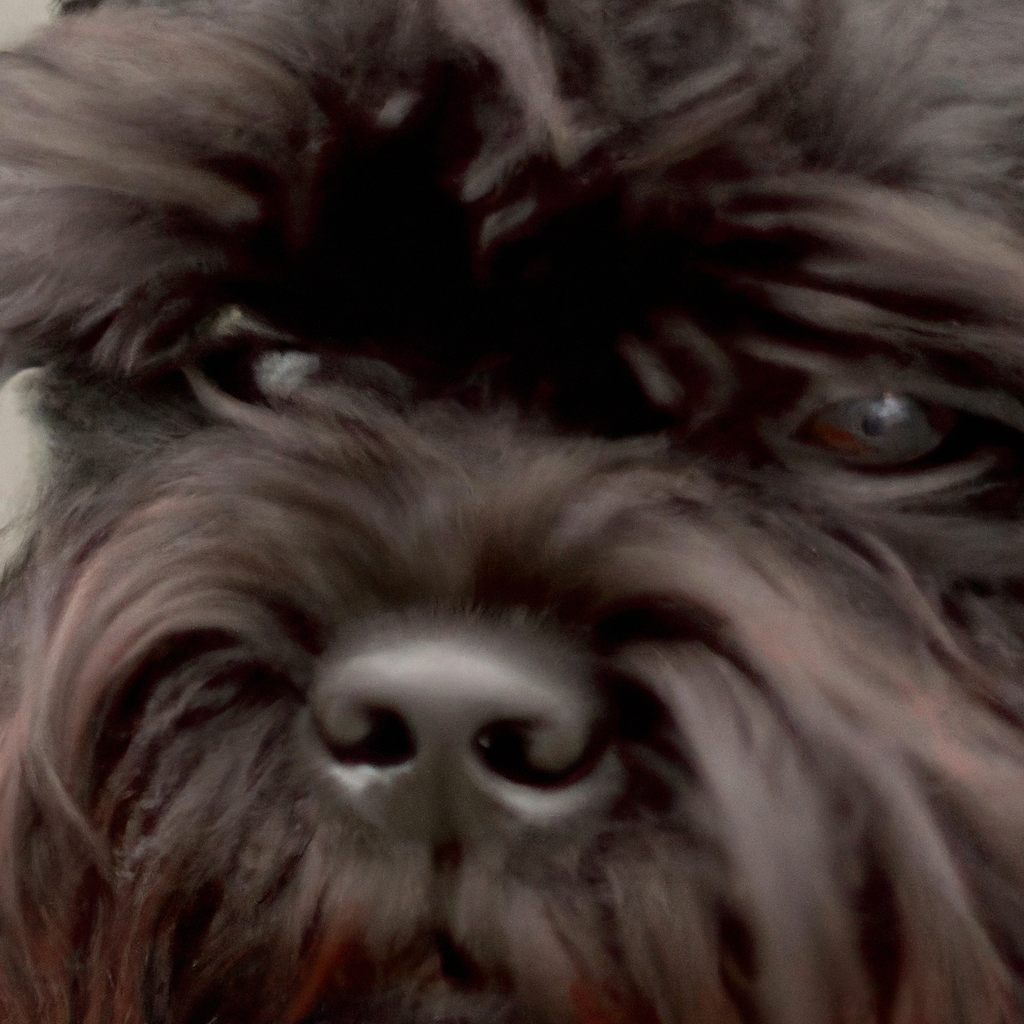
The Affenpinscher, affectionately known as the “Monkey Dog” due to its primate-like appearance and playful nature, is a small breed that packs a big personality. This breed is known for its longevity, with a lifespan that typically ranges from 12 to 15 years. However, like all breeds, the Affenpinscher’s aging process is influenced by a variety of factors, including genetics, diet, exercise, and overall health care.
One of the most notable characteristics of the Affenpinscher’s lifespan is its relatively slow aging process. Unlike larger breeds that tend to age more rapidly, small breeds like the Affenpinscher often maintain their youthful energy and playful demeanor well into their senior years. This is not to say that they don’t experience the typical signs of aging, but rather that these signs often appear later and progress more slowly than in larger breeds.
As Affenpinschers age, they may begin to show signs of slowing down. They may not be as quick to chase a ball or leap onto the couch, and they may prefer shorter walks over long adventures. However, this decrease in activity is often gradual and should not be cause for alarm. In fact, maintaining a consistent, albeit less strenuous, exercise routine can help keep an aging Affenpinscher healthy and happy.
In addition to changes in activity level, Affenpinschers may also experience changes in their dietary needs as they age. Senior Affenpinschers often require fewer calories than their younger counterparts, as their metabolism slows down. However, they still need a diet rich in high-quality protein to support muscle mass, as well as plenty of fiber to aid digestion. Regular vet check-ups can help ensure that your Affenpinscher’s diet is meeting their changing nutritional needs.
While the Affenpinscher’s long lifespan is certainly a blessing, it also means that this breed is more likely to experience age-related health issues. Common health problems in senior Affenpinschers include dental disease, heart disease, and arthritis. Regular vet visits and preventative care can go a long way in catching these issues early and managing them effectively.
Despite these potential health issues, many Affenpinschers continue to lead active and fulfilling lives well into their senior years. Their playful nature and strong bond with their human companions often keep them young at heart, even as their bodies begin to show signs of age.
In conclusion, the Affenpinscher’s lifespan and aging process are characterized by a slow and gradual decline in activity level, changes in dietary needs, and an increased risk of age-related health issues. However, with proper care and attention, these little “Monkey Dogs” can continue to bring joy and companionship to their families for many years. Whether they’re chasing a ball, snuggling on the couch, or simply watching the world go by from their favorite window, Affenpinschers are a testament to the old adage that age is just a number.
Grooming Essentials for Your Affenpinscher
The Affenpinscher, affectionately known as the “Monkey Dog” due to its primate-like appearance and playful nature, is a small but sturdy breed that originated in Germany. This breed is known for its distinctive, wiry coat that gives it a unique, shaggy appearance. While Affenpinschers are relatively low-maintenance compared to other breeds, they still require regular grooming to keep their coats healthy and looking their best.
One of the most important aspects of grooming an Affenpinscher is regular brushing. Their wiry coats are prone to matting and tangling, so it’s recommended to brush them at least two to three times a week. This not only helps to keep their coats looking neat, but also removes any loose hair and stimulates the natural oils in their skin, which helps to keep their coats healthy and shiny.
When brushing your Affenpinscher, it’s best to use a slicker brush or a comb with both wide and narrow teeth. Start by brushing in the direction of hair growth to remove any loose hair and dirt. Then, brush against the direction of hair growth to fluff up the coat and give it that distinctive Affenpinscher look. Be gentle when brushing, as their skin can be sensitive.
In addition to regular brushing, Affenpinschers also require occasional trimming to keep their coats looking neat. This is especially true for the hair around their eyes and mouth, which can become long and unruly if not regularly trimmed. However, it’s important to note that Affenpinschers should not be shaved or clipped too short, as this can damage their wiry coat and affect its texture.
Bathing your Affenpinscher should be done sparingly, as too frequent baths can strip their coats of natural oils and lead to dry, itchy skin. It’s generally recommended to bathe them once every two to three months, or whenever they get particularly dirty. Use a gentle, dog-specific shampoo and make sure to rinse thoroughly to avoid any residue that could irritate their skin.
Don’t forget about your Affenpinscher’s nails, ears, and teeth. Regular nail trims are necessary to prevent overgrowth and the discomfort that can come with it. Their ears should be checked weekly for any signs of infection, such as redness, swelling, or a bad smell. Clean them as necessary with a vet-approved ear cleaner. Dental care is also important, as small breeds like the Affenpinscher are prone to dental issues. Regular brushing with a dog-specific toothpaste can help to prevent these problems.
Finally, remember that grooming is not just about maintaining your Affenpinscher’s appearance, but also about keeping them healthy and comfortable. It’s a good opportunity to check for any signs of skin issues, parasites, or other health problems that may not be immediately obvious. Plus, many dogs come to enjoy the attention and bonding time that comes with grooming.
In conclusion, while Affenpinschers are relatively low-maintenance, they still require regular grooming to keep their distinctive coats healthy and looking their best. With regular brushing, occasional trims, and proper care for their nails, ears, and teeth, you can help your Affenpinscher look and feel their best.
The Affenpinscher’s Diet: What You Need to Know
The Affenpinscher, often referred to as the “Monkey Terrier” due to its primate-like appearance and playful nature, is a small but sturdy breed that originated in Germany. This breed is known for its distinctive, wiry coat and expressive face, but there’s more to these charming dogs than meets the eye. One of the most important aspects of caring for an Affenpinscher is understanding their dietary needs.
Affenpinschers, like all dogs, require a balanced diet to maintain their health and vitality. However, due to their small size, they have unique nutritional needs that differ from larger breeds. They require a diet that is high in protein to support their muscle development and energy levels. Protein sources can include chicken, beef, fish, or lamb. It’s also important to include carbohydrates in their diet for energy, but these should be complex carbs like sweet potatoes or brown rice, rather than simple sugars.
In addition to protein and carbohydrates, Affenpinschers also need a good amount of fiber in their diet to aid digestion. This can be provided through fruits and vegetables, which also supply essential vitamins and minerals. However, it’s important to remember that not all fruits and vegetables are safe for dogs, so always do your research or consult with a vet before introducing new foods into your Affenpinscher’s diet.
While it’s crucial to provide your Affenpinscher with the right nutrients, portion control is equally important. Affenpinschers are small dogs, typically weighing between 6 to 13 pounds, and overfeeding can easily lead to obesity, which can in turn lead to a host of health problems. It’s recommended to feed adult Affenpinschers twice a day, with the total daily amount of food being approximately one cup. Puppies, on the other hand, require more frequent feedings.
Another important aspect of an Affenpinscher’s diet is hydration. These dogs should always have access to fresh, clean water. Dehydration can lead to serious health issues, so it’s crucial to ensure your Affenpinscher is drinking enough, especially during hot weather or after exercise.
When it comes to treats, moderation is key. While it’s tempting to spoil your Affenpinscher with treats, these should only make up a small portion of their overall diet. Too many treats can lead to weight gain and other health issues. Instead, consider using healthy options like small pieces of fruits or vegetables as treats.
Lastly, it’s worth noting that every Affenpinscher is unique, and what works for one dog may not work for another. Factors such as age, weight, activity level, and health status can all affect a dog’s dietary needs. Therefore, it’s always a good idea to consult with a vet or a canine nutritionist to create a personalized diet plan for your Affenpinscher.
In conclusion, feeding your Affenpinscher a balanced, portion-controlled diet that is rich in protein, complex carbohydrates, and fiber, along with ensuring they stay hydrated and moderating their treat intake, can go a long way in keeping them healthy and happy. Remember, a well-fed Affenpinscher is a happy Affenpinscher!
Exercise Requirements for the Affenpinscher Breed
The Affenpinscher breed, often referred to as the “Monkey Terrier” due to its primate-like appearance and playful nature, is a small but mighty dog breed that is full of energy and personality. These dogs are known for their distinctive, wiry coats and expressive faces, but there’s more to this breed than just their looks. One of the most important aspects to consider when owning an Affenpinscher is their exercise requirements.
Affenpinschers are a lively and active breed. Despite their small size, they have a lot of energy to burn off. Regular exercise is crucial for this breed to keep them healthy, happy, and well-behaved. Without enough physical activity, Affenpinschers can become bored and may resort to destructive behaviors such as chewing or digging.
However, it’s important to note that while Affenpinschers are energetic, they don’t require as much exercise as larger, more active breeds. A few short walks a day, coupled with some playtime, is usually enough to keep these little dogs satisfied. They love to play and will happily engage in games of fetch or tug-of-war. Their small size makes them ideal for apartment living, as they can get a lot of their exercise indoors.
Despite their adaptability to indoor living, Affenpinschers still enjoy the great outdoors. They love to explore and sniff around, so taking them to a secure, fenced-in yard or park can be a real treat. However, due to their small size and curious nature, it’s essential to keep a close eye on them while they’re outside. They’re known to be a bit of escape artists, so ensuring they’re in a secure area is crucial.
In addition to physical exercise, Affenpinschers also require mental stimulation. They’re intelligent dogs that enjoy problem-solving activities. Puzzle toys, training sessions, and interactive games can help keep their minds sharp. Training an Affenpinscher can be a fun and rewarding experience, as they’re eager to please and quick to learn. However, they can also be a bit stubborn at times, so patience and consistency are key.
It’s also worth noting that while Affenpinschers are generally a healthy breed, they can be prone to certain health issues, such as hip dysplasia and heart problems. Regular exercise can help mitigate these risks and keep your Affenpinscher in good health. However, it’s important not to over-exercise these little dogs. Their small size means they can become exhausted quickly, so it’s essential to monitor them during exercise and give them plenty of breaks.
In conclusion, while Affenpinschers are small in size, they’re big on personality and energy. Regular exercise, both physical and mental, is crucial for this breed. A few short walks a day, coupled with playtime and mental stimulation, is usually enough to keep an Affenpinscher happy and healthy. However, it’s important to monitor them during exercise and ensure they’re not overdoing it. With the right balance of exercise and rest, an Affenpinscher can make a lively, loving, and entertaining addition to any home.
The History and Origin of the Affenpinscher Breed
The Affenpinscher breed, often referred to as the “Monkey Terrier” due to its primate-like appearance and playful nature, has a rich and fascinating history. Originating from Germany in the 17th century, this breed was initially developed to serve as a ratter, a dog skilled in catching rats and other small vermin. The name ‘Affenpinscher’ itself translates to ‘monkey terrier’ in German, a testament to its distinctive facial features and lively personality.
The Affenpinscher’s journey from a working dog to a beloved companion is an interesting one. In the early days, these dogs were larger than the Affenpinschers we know today, standing about 12 to 13 inches tall. They were primarily used in stables, shops, and homes to control the rat population. Their agility, courage, and tenacity made them excellent at this job. However, as time passed, their endearing looks and charming demeanor caught the attention of the German nobility.
In the late 18th and early 19th centuries, Affenpinschers began to be bred as companion dogs for the ladies of the house. Breeders started to reduce their size through selective breeding, resulting in the smaller, more lap-friendly Affenpinscher we see today, typically standing between 9 to 12 inches tall. Despite their reduced size, they retained their fearless and energetic nature, making them entertaining companions.
The Affenpinscher’s popularity began to spread beyond Germany’s borders in the late 19th century. They were particularly well-received in France, where they were often depicted in paintings by famous artists such as Toulouse-Lautrec. The breed was officially recognized by the American Kennel Club (AKC) in 1936, but World War II put a halt to its growing popularity in the United States. It wasn’t until the 1950s that the breed began to regain its footing in America.
The Affenpinscher’s distinctive appearance has always been one of its most appealing characteristics. With their dark, round eyes, bushy eyebrows, and shaggy coat, they have a unique look that is both comical and endearing. Their coat, typically black but also found in shades of gray, silver, red, or black and tan, is dense and rough, giving them a somewhat unkempt appearance. This, combined with their confident and mischievous demeanor, contributes to their monkey-like persona.
Despite their small size, Affenpinschers are known for their bold and stubborn nature. They are fearless, curious, and always ready for an adventure. They are also incredibly loyal and protective of their families, making them excellent watchdogs. However, they can be somewhat territorial and do not always get along with other dogs or pets. Training and socialization from a young age can help mitigate these issues.
In conclusion, the Affenpinscher breed has a rich history that has shaped its unique characteristics. From its origins as a rat-catcher in Germany to its status as a beloved companion dog, the Affenpinscher has always been cherished for its distinctive appearance and lively personality. Despite its small size, this breed has a big heart and an even bigger personality, making it a wonderful addition to any family.The Affenpinscher breed is known for its distinctive appearance and playful, adventurous nature. They are small but sturdy with a lot of energy, making them great companions for active individuals or families. They are also known for their loyalty and protective nature, often acting as watchdogs for their homes. Despite their small size, they are fearless and can be stubborn at times. They require regular mental and physical stimulation to prevent boredom and destructive behavior. Affenpinschers are generally healthy but can be prone to certain breed-specific conditions. They have a long lifespan, often living up to 15 years or more with proper care. Their coat requires regular grooming to maintain its distinctive shaggy appearance. Overall, Affenpinschers are loving and loyal pets with a spirited and bold personality.
